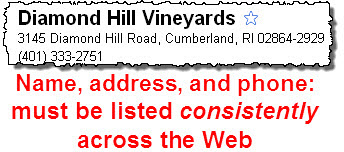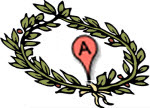I apologize in advance if sports metaphors annoy you.
But if you can tolerate them, I’ve got a good one: Getting your business visible in Google Places is like the Olympic decathlon.
(You know, that 10-event track-and-field challenge that’s as painful to watch as seeing someone eat a pack of Jolly Ranchers the day after getting a root canal.)
How is local visibility like the decathlon? For one thing, both demand balance—being strong in many different respects. You can’t win one event and win the decathlon. Same thing if you want to get visible in Google Places: you must do many things well, not just one or two.
You win the decathlon if you rack up the most points—points earned by performing at a high level from the 1st event through the 10th. Google has its “algorithm”: dozens of factors big and small that Google takes into account when deciding which local businesses get medals and which ones get a pat on the back. Bottom line: you don’t have to win every event. The winners are the ones with the most points overall.
Here’s how I’d compare each decathlon event to 10 of the biggest components of a top Google Places ranking:
Picking the right city to market yourself in = Javelin. Precision counts: you have to know exactly where you want to place yourmark. Anyone can chuck spears downfield, but a skilled javelin-thrower visualizes exactly where he wants the spear to go. In Google Places, you have to set your sights on a very specific local area: usually the one your business is physically located in. If you just try to get visible in “greater San Diego” or “within 50 miles of here,” you’ll end up disappointed, and you’ll lose business to any competitors who plan their throws with more precision and finesse.
Picking the right business “Categories” = 100m sprint. The 100m sprint is the first event in the decathlon. “Categories” are one of the first things you specify about your business when you create your Google listing. Both are quick and relatively painless, but if you screw up either one, you put yourself at a disadvantage. (By the way, in a nutshell, the way to pick “Categories” well is to pick only the ones that are dead-on relevant to your services. It’s easy, but many people screw it up.)

Listing your business on 3rd-party sites (AKA getting “citations”) = Shot put. The shot requires brute strength, but also plenty of technique. Likewise, you likely won’t get visible in Google if someone can’t muscle through the arduous process of submitting your business info to numerous directory sites (Yelp, Angie’s List, etc.). But this also involves technique, in knowing which sites can help you the most.
Making sure your basic info appears consistently across the Web = Long jump. Many business owners don’t know that their business is actually listed on sites they’ve never heard of. You have to reach far and wide across the Web to find these sites and make sure all your basic business info—business name, address, phone number, etc—is listed 100% correctly there.

Informative, useful, search term-relevant website content = 400m sprint. A short but intense race. Anyone can waddle a lap around the track, but to do it in less than 50 seconds is way harder than it looks. Anyone can get “content, but it’s hard to get good, relevant content on your website that appeals to local customers and helps answer their questions: it takes a little time and effort to write good stuff. It needs to be clearly relevant to the services you’re trying to get found for, but overloading your content with “keywords” will get you nowhere in Google. But with a few bursts of focused, intense work, you can get winning content—stuff that Google can tell is relevant to your services, and that’s helpful and informative enough to win you local customers.
(Effective) on-page SEO = High jump. The high jump takes technique and “feel” and is very tricky to execute properly. Brute force won’t help you clear anything higher than a baby bar. A typical SEO “expert” can apply simplistic tactics—like overstuffing your meta tags with keywords—but it takes more finesse and especially a light touch if you want to get visible in local Google.
Beefing up your Google Places listing = 110m hurdles. Hurdlers have to contend with lots of obstacles (each hurdle). Any one of them isn’t too hard to clear, but it’s much tougher to clear all of them smoothly while bolting full-throttle down the track. You have to optimize multiple little areas on your Google page: your “Description,” photos, etc. None is too tough, but you can’t take your eye off them, or else you get a scraped knee and lose ground to other people
Inbound links to your site = Pole vault. You have a few attempts to fling yourself over a high bar. Similarly, it may take several attempts to get some good, industry-related or locally relevant links coming into your site. It can test your patience. But once you have some relevant, quality links coming in, you can take a deep breath (for a little while, at least).
Continually adding content everywhere = Discus…wait. I actually don’t see how this is like the discus. Kind of coming up dry here. Anyway, what I will say is it’s important that you keep on the lookout for ways to add more and more relevant content to your site, and to add things like coupons, real-time “Posts,” and even videos to your Google Places listing. Keep it fresh and keep it coming. Google pays attention to activity and progress—and so do your potential customers.
Customer reviews = 1500m run. The last and longest event. You’re running on fumes. You have your hands full with running your business, and drumming up customer reviews is probably the last thing you feel like doing. But you’ve come this far and can’t quit now. It takes endurance, because you have to keep the reviews coming in on an ongoing basis. Like the 1500, reviews require you to pace yourself: if you try to get too many reviews at once, Google will likely conclude that you’re not getting them legitimately, and you’ll get nowhere fast. Impatient jackrabbits lose. Reviews can be tricky to get, but you’ll be glad once you have them—and you’ll enjoy watching your lesser competitors finish in tatters because they couldn’t hang on.
In the decathlon and in Google Places, it’s the big-picture that counts. You can win even if you only manage to blow ‘em out of the water in a couple of events, and you can win even if you do downright lousy in one event. But you will only emerge as a stone-cold butt kicker if you’re consistently strong.
 Are there even more track & field events worth clobbering your competition in? Yes: you’ve got the 800m run, the 5000m run…and many others. Likewise, there are even more elements of getting visible in Google Places.
Are there even more track & field events worth clobbering your competition in? Yes: you’ve got the 800m run, the 5000m run…and many others. Likewise, there are even more elements of getting visible in Google Places.
But if you shine in all of the above, you’re a regular Bryan Clay, and you’ll get that laurel wreath around YOUR neck—meaning more local customers coming through your doors.
Leave a Reply